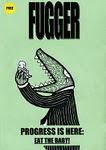Chapter Three:
The human brain is mainly concerned with two things. The survival of the human body is the first and making the human body’s survival an enjoyable experience is the second. The human brain learns how to do the latter with the information it receives from the telly. The telly knows how to make the human body’s survival an enjoyable experience because it was told how to by the shops. The shops are collectively known as The Market and The Market is controlled by a collection of human brains that have gone insane because they have taken in too much information simultaneously (see chapter two in the previous post).
Chapter Four:
Sane human brains being guided by the insanity of The Market is one of the many paradoxes the human brain must endure in its search for ways to make the survival of the human body enjoyable. Another paradox is found in the existence of consciousness and indeed conscience. Conscience is a by-product of consciousness and serves to create moral and philosophical reasoning that may or may not be reasonable. Different human brains will favour different reasonings and often find themselves in disagreement.
An example:
Wife:
I think the people of the world would find contentment in a non-merchant capitalist society based on a principle of direct and inclusive democracy. What do you think?
Husband:
I think you should quit yer yapping coz I’m trying to watch the golf.
Wife:
I think you’re a monster.
Husband:
I think that cat you adopted is a monster. Now make me a sandwich.
Disagreements like the above can lead to the survival of the human body being a less enjoyable experience. To prevent this, human brains, once again, resort to the information filter known as the telly for guidance and the telly resorts to the shops which are collectively known as The Market and The Market is controlled by a collection of human brains that have gone insane because they have taken in too much information simultaneously (see chapter two in the previous post).
But:
There
Is
No
Alternative!
And that is the story of the human brain.
The End.


No comments:
Post a Comment